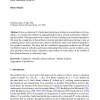Free Online Productivity Tools
i2Speak
i2Symbol
i2OCR
iTex2Img
iWeb2Print
iWeb2Shot
i2Type
iPdf2Split
iPdf2Merge
i2Bopomofo
i2Arabic
i2Style
i2Image
i2PDF
iLatex2Rtf
Sci2ools
ANOR
2008
2008
NP-hardness results for the aggregation of linear orders into median orders
Abstract Given a collection of individual preferences defined on a same finite set of candidates, we consider the problem of aggregating them into a collective preference minimizing the number of disagreements with respect to and verifying some structural properties. We study the complexity of this problem when the individual preferences belong to any set containing linear orders and when the collective preference must verify different properties, for instance transitivity. We show that the considered aggregation problems are NP-hard for different types of collective preferences (including linear orders, acyclic relations, complete preorders, interval orders, semiorders, quasi-orders or weak orders), if the number of individual preferences is sufficiently large. Keywords Complexity
| Added | 08 Dec 2010 |
| Updated | 08 Dec 2010 |
| Type | Journal |
| Year | 2008 |
| Where | ANOR |
| Authors | Olivier Hudry |
Comments (0)

